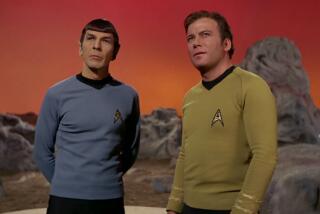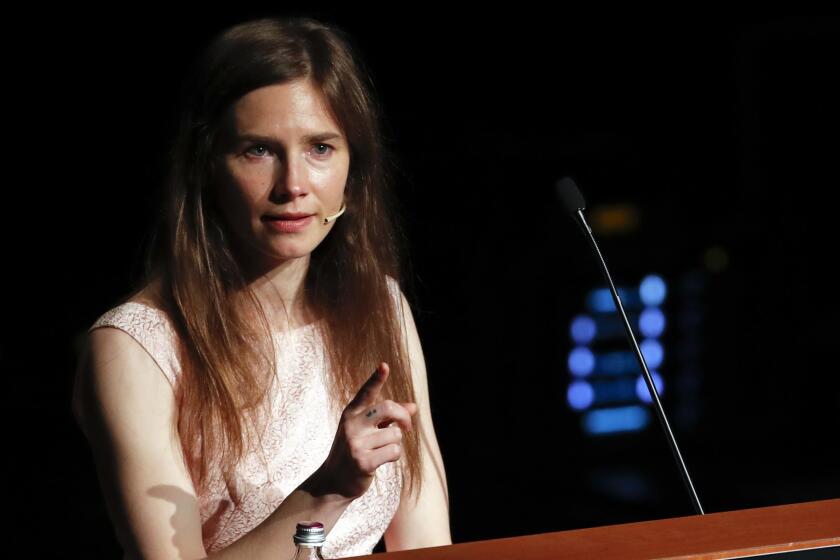Roddenberry’s TV ‘Trek’ Into the Final Frontier
- Share via
“Star Trek” is a phenomenon that has become an industry. On the Paramount lot these days, weirdly costumed characters from the television series “Star Trek: The Next Generation” en route to their sound stage nod cheerfully at weirdly costumed characters from the film “Star Trek V,” en route to theirs, as the two Enterprise enterprises take shape almost side by side.
“The Next Generation” did not melt the hearts of all television critics but it is playing in syndication on at least 213 stations, has outdrawn the network affiliates on some nights in some markets and demonstrates its clout by having Whoopi Goldberg in a recurring role as Guinan, the starship’s “alien humanoid hostess,” alias bartender.
The movie versions of “Star Trek” have zapped to smithereens the laws of diminishing returns about sequels by seeming to get better and better. “Star Trek IV,” with its plot about saving the whales in the present day, found audiences well beyond the Trekkie loyalists and was often regarded as the wittiest and best of the films thus far.
The 79 episodes of the original “Star Trek” series, which was launched in 1965 and appeared to have crashed on takeoff, are rerunning constantly almost any place on Earth you can plug in a television set.
All of this is a source of considerable bemusement and income to the 6-foot-3, 2l5-pound ex-airline pilot, ex-LAPD sergeant who invented “Star Trek,” having promised the studio, as he famously said, “a ‘Wagon Train’ to the stars.”
Gene Roddenberry, now 67, was born in El Paso, Tex., his father a regular Army cavalryman at Ft. Bliss who later went into law enforcement in Southern California.
Roddenberry (like another well-known creator, Francis Coppola) was seriously ill as a child and had to spend months in bed. “My mother taught me to read when I was 4 or 5,” Roddenberry said the other day, “and I read. Read everything. It fired up my imagination, so much so that my mother warned my father I might get lost in my imagination permanently.”
More practically, he majored in engineering at UCLA and became a Pan American Airlines pilot, flying the New York-Calcutta route. “That shapes you, those hours in the cockpit,” Roddenberry says. “Those long night flights up the west coast of Africa are bound to touch you if you’re a romantic at all.”
After five years of it, Roddenberry came back to Los Angeles and joined the Police Department, working primarily as a kind of ghost writer of speeches and texts for the late Chief William H. Parker, whom he idolized.
He also began writing for television, dramas for “The U. S. Steel Hour” and episodes for that remarkable series “Have Gun, Will Travel,” on which he was eventually named head writer. In its way, “Have Gun” can be seen as a precursor of “Star Trek,” in that it was witty and sophisticated and used the format as an anthology for themes and situations that only incidentally had anything to do with the West.
“My first Emmy,” says Roddenberry, “was for comedy, an episode of ‘Have Gun’ in which Paladin (Richard Boone) was hired to rescue a man’s daughter.”
At the time he was asked to produce what became “Star Trek,” Roddenberry had just been re-reading “Gulliver’s Travels,” one of the loves of his convalescing childhood. “I realized that it was not just a great story, it was about insane kings and injustice and a lot of other things.”
The possibility of split-level entertainments that worked as both story and commentary was already clear to Roddenberry, but “Star Trek” was conceived as a format that would maximize the freedom to play both show and tell.
The trip to the future now seems a long way back in history. “We had to explain computers,” Roddenberry remembers. “And our effects were primitive: Our stars were a black cloth with holes in it and light behind. The episodes cost $186,000. They’re $1.3 million for ‘The Next Generation.’ I wanted to cast a woman as second-in-command. NBC said no way. The network may have been right; maybe the audience wasn’t ready for a woman then, but I’m not sure.”
Roddenberry wrote not only a pilot episode for “Star Trek” (“The Cage,” part-color, part-black and white, unaired at the time but now available on cassette), but also a “bible,” dozens of pages detailing the characters, the ship and its technologies, the 23rd-Century deep space they were adventuring in. “Had to tell the writers the difference between a galaxy and a solar system.”
“I’m a storyteller,” Roddenberry says. But from the start he was using fantasy as a way of exploring present and historical reality, making science fiction a device for creating a kind of hand-tailored reality for examining a problem.
“Writers used to tell me it was the hardest show in television to write for because you had to know so much about so much. History, economics. It’s hard enough to write a cop show, but here you’re going to deal with other life styles and moral values. You don’t get that in ‘Miami Vice.’ Should the bad guys go to jail? That’s an idea we were kicking around one afternoon.”
Now, as then, he says, “We sit around and talk and argue and it’s like a college bull session. It’s exciting to ask ourselves, ‘What are the big issues we could be addressing. How can we deal with the destruction of the forests? Gangs. What about gangs? Isn’t it natural to form gangs? What makes this happen, and how could you deflect the energy in better directions?’ In science fiction you can invent a place where you can comment.”
It is all perfectly clear now. But in 1965-66 the timing seemed catastrophically--but, as it turned out, not fatally--wrong. “Science fiction was not in. It was on the bottom shelf in the bookstores. Arthur C. Clarke and Isaac Asimov loved us, and college professors as well as the kids.”
But they did not show up in the ratings. They did show up--about the time NBC was killing the show--in the demographics. “NBC was just getting into demographics,” Roddenberry recalls, “looking for those bright, young viewers who bought a lot. One of their researchers said, ‘Great, guys, you’ve just canceled the one show with the perfect demographics we’re after.”
After the first season cancellation, those legendary million letters of protest from the fans brought the show back for two more seasons. But the ratings were still, by NBC’s calculations, inadequate. The show left the air, but the proper image was of a volcano gone dormant but quickly beginning to rumble again, with ever more shaking of the film and television firmament.
“I figured we might rerun twice or so,” Roddenberry says. “The rights could have been bought for $250,000. Desilu was sold to Paramount in the middle of our second year and ‘Star Trek’ was just thrown in as part of the deal. What it’s generated for Paramount by now is anybody’s guess, but it has to be over a billion.”
The appeal of “Star Trek” has been endlessly analyzed. The show is a favorite subject for theses and dissertations, mostly about its concern for social issues. But Ray Bradbury has said that space is the new religion, the new reservoir of optimism, heroism and idealism for young people, and Roddenberry agrees that this, along with the storytelling and the social concerns, is part of the allure.
“Earth is the nest, the cradle, and we’ll move out of it,” Gene Roddenberry says. “The human being is a bold animal, and we try to be about the human spirit.”
More to Read
The complete guide to home viewing
Get Screen Gab for everything about the TV shows and streaming movies everyone’s talking about.
You may occasionally receive promotional content from the Los Angeles Times.






